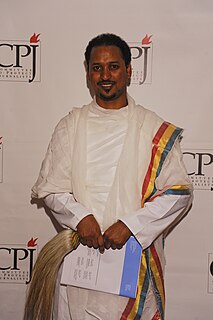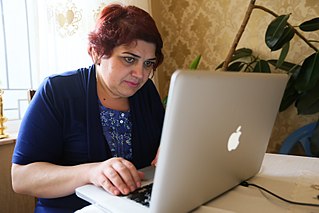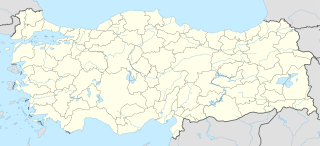Related Research Articles

According to the U.S. Department of State's annual report on human rights in Mali for 2003, Mali's government generally respects the human rights of its citizens and observes relevant constitutional provisions and prohibitions.

Human rights in the State of Palestine refers to the human rights record in the West Bank and Gaza.

Human rights in Egypt are guaranteed by the Egyptian Constitution under the various articles of Chapter 3. The country is also a party to numerous international human rights treaties, including the International Covenant on Civil and Political Rights and the International Covenant on Economic, Social and Cultural Rights. However, the state of human rights in the country has been criticized both in the past and the present, especially by foreign human rights organizations such as Amnesty International and Human Rights Watch, although the Egyptian government has frequently rejected such criticism. According to human rights groups, as of January 2020 there are some 60,000 political prisoners in Egypt. "The worst mass killing in Egypt’s modern history" occurred during the dispersal of a sit-in on 14 August 2013, when as many as 900 protesters were killed.

Oman is an absolute monarchy in which all legislative, executive, and judiciary power ultimately rests in the hands of the hereditary sultan, and in which the system of laws is based firmly on Islamic sharia. Although a report by the U.S. State Department, based on conditions in 2010, summed up the human rights situation in the country by asserting that the government "generally respected the human rights of its citizens," the details in the report itself strongly indicate otherwise, and several international human-rights groups have described the state of human rights in Oman in highly critical terms. According to a report, on 20 December 2015, poet and television producer Nasser al-Badri was summoned by the Police Special Section and detained for 12 days without charge and without trial. The report added that the Omani Observatory for Human Rights said that al-Badri was detained because of tweets he posted criticising Sultan Qaboos and the state of the country's economy. Article 41 of Oman's statute (constitution) criminalizes any criticism of the sultan, stating that "the sultan's person is inviolable and must be respected and his orders must be obeyed".

Censorship in Turkey is regulated by domestic and international legislation, the latter taking precedence over domestic law, according to Article 90 of the Constitution of Turkey.
The Sunday Leader was an English-language Sri Lankan weekly newspaper published by Leader Publications (Private) Limited. It was founded in 1994 and is published from Colombo. Its sister newspapers are the Iruresa (Irudina) and the defunct The Morning Leader. Founded by brothers Lasantha Wickrematunge and Lal Wickrematunge, the newspaper is known for its outspoken and controversial news coverage. The newspaper and its staff have been attacked and threatened several times and its founding editor Lasantha Wickrematunge was assassinated.
Amar Desh is a defunct daily newspaper in Bangladesh, published from Dhaka in the Bengali language since 2004. Amar Desh provides news about Bangladesh from local and regional perspectives and covers international news. Amar Desh is considered a popular opposition newspaper in Bangladesh and takes an editorial stance that favours the Bangladesh Nationalist Party. The newspaper has been closed down by the government of Bangladesh.
Jamal Amer is a journalist from Yemen. He is the editor of the weekly journal Al-Wasat, which he founded in 2004. Al-Wasat frequently publishes reports critical of the government from international human rights organizations.
Judge María Lourdes Afiuni Mora is a Venezuelan who was 46 years old as of April 2010 and had served as a judge for eight years; she was head of the 31st Control Court of Caracas. In 2009 she was arrested on charges of corruption after ordering the conditional release on bail of businessman Eligio Cedeño, who then fled the country. She was moved to house arrest in Caracas in February 2011, and granted parole in June 2013, but she is still barred from practicing law, leaving the country, or using her bank account or social networks.

Dawit Kebede, is an Ethiopian journalist and winner of the 2010 CPJ International Press Freedom Award.

Azimzhan Askarov was an ethnic Uzbek Kyrgyzstani political activist who founded the group Vozduh in 2002 to investigate police brutality. During the 2010 South Kyrgyzstan ethnic clashes, which primarily targeted people of the Uzbek nationality, Askarov worked to document the violence.
Özgür Gündem was an Istanbul-based daily Turkish language newspaper, mainly read by Kurds. Launched in May 1992, the newspaper was known for its extensive reporting on the Kurdish-Turkish conflict, and was regularly accused of making propaganda for the Kurdistan Workers' Party (PKK). Its editors and staff have frequently been arrested and prosecuted, which resulted in multiple publication bans. Since April 1994, the publication continued under different names until Özgür Gündem was relaunched in 2011.

The Abdiaziz Abdinur Ibrahim controversy began in February 2013 when journalist Abdiaziz Abdinur Ibrahim interviewed Lul Ali Osman, who claimed that she was raped by government security forces while living in an internally displaced peoples camp in Mogadishu, Somalia. The two were arrested, tried, and sentenced to a year in prison for having allegedly fabricated the story. The trial was described by some human rights groups as politically motivated. Osman was later in the month acquitted following an appeal, and Ibrahim's sentence was reduced to six months. It was concurrently announced that an Independent Task Force on Human Rights had been established, which would review his case to see if due process has been followed. Ibrahim was released from detention the following month, on 17 March 2013.

Khadija Rovshan qizi Ismayilova, also Ismailova, is an Azerbaijani investigative journalist and radio host who is currently working for the Azerbaijani service of Radio Free Europe/Radio Liberty, until recently as the host of the daily debate show İşdən Sonra. She is a member of the Organized Crime and Corruption Reporting Project.

Rauf Habibulla oghlu Mirgadirov is an Azerbaijani columnist and journalist. He has worked for the Baku based Russian-language newspaper Zerkalo. A believer in "citizen diplomacy" between Armenia and Azerbaijan over the Nagorno-Karabakh conflict, Mirgadirov was arrested for allegedly spying for Armenia and has been detained since April 2014. In December 2015, he was found guilty and sentenced to six years of prison. Following an appeal of his case, the ruling was upheld in March 2016, but Mirgadirov was released on suspended sentence.

The 2016–present purges in Turkey is a series of purges by the government of Turkey enabled by a state of emergency in reaction to the 15 July failed coup d'état. The purges began with the arrest of Turkish Armed Forces personnel reportedly linked to the coup attempt but arrests were expanded to include other elements of the Turkish military, as well as civil servants and private citizens. These later actions reflected a power struggle between secularist and Islamist political elites in Turkey, affected people who were not active in nor aware of the coup, but who the government claimed were connected with the Gülen movement, an opposition group which the government blamed for the coup. Possession of books authored by Gülen was considered valid evidence of such a connection and cause for arrest.
Ruhollah Zam was an Iranian activist and journalist. He was best known for operating a Telegram channel named 'Amadnews', which he founded in 2015. Zam played a high-profile role in the 2017–2018 Iranian protests, to which he devoted special coverage at the time. In June 2020, an Iran court found him guilty of "corruption on earth" for running a popular anti-government forum, which officials said had incited the 2017–2018 Iranian protests. He was sentenced to death by an Iranian court and was executed on 12 December 2020.
The Sultanate of Oman, established on August 9, 1970, is an absolute monarchy in which all the power resides with the sultan. The government controls what information the mass media relays, and the law prohibits any criticism of the Sultan or government.
Soulaimane Raissouni is a Moroccan journalist, editorialist, and human rights activist. He was working as the chief editor of the newspaper Akhbar Al Yaoum, being notable for his editorials, criticizing government corruption and advocating political reform. On May 22, 2020, Raissouni was arrested over charges of “indecent assault” against another man. His arrest triggered a movement of solidarity among his sympathizers, both in Morocco and internationally, alleging that his case is part of a defamation campaign targeting journalists and rights activists critical of Moroccan authorities.
References
- ↑ "Third journalist from Azamn newspaper arrested in Oman - Committee to Protect Journalists". cpj.org. Retrieved 2016-08-15.
- ↑ "Oman: Journalists Sentenced Over Articles Alleging Corruption". 2016-10-03. Retrieved 2016-10-03.
- ↑ "Oman: Journalists detained for reporting on corruption". www.amnesty.org. Retrieved 2016-08-15.
- ↑ "Oman detains second journalist from Azamn newspaper - Committee to Protect Journalists". www.cpj.org. Retrieved 2016-08-15.
- ↑ "Oman: Newspaper Shuttered, Editor Held". 2016-08-13. Retrieved 2016-08-15.
- ↑ "Oman closes down newspaper, journalists held (Reuters)" . Retrieved 2016-08-15.
- ↑ The Associated Press (2016-08-10). "Oman Detains 3 Journalists, Shuts Down Newspaper Over Story". The New York Times. ISSN 0362-4331 . Retrieved 2016-08-15.
- ↑ Americans for Democracy and Human Rights in Bahrain (August 12, 2016). "Oman Arresting Journalists in Affront to Free Press" . Retrieved 2016-08-15.
- ↑ Al Mukrashi, Fahad (2016-08-10). "Oman shuts down newspaper for targeting judiciary". Gulf News. Retrieved 2016-08-15.
- ↑ "Oman: Newspaper Shuttered, Editor Held". 2016-08-13. Retrieved 2016-08-15.
- ↑ "Open letter to Sultan of Oman about detained Azamn journalists". rsf.org (in French). Reporters without borders. Retrieved 2016-09-01.
- ↑ "Open letter to Sultan of Oman about detained Azamn journalists | Reporters without borders". RSF (in French). Retrieved 2016-09-01.
- ↑ "Oman: Journalists Sentenced Over Articles Alleging Corruption". 2016-10-03. Retrieved 2016-10-03.
- ↑ "Oman: Journalists Sentenced Over Articles Alleging Corruption". 2016-10-03. Retrieved 2016-10-03.